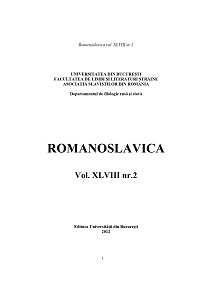Umelecký preklad ako hodnotový indikátor. K problematike Recepcie západoeurópskych literatúr na Slovensku v období národného obrodenia (1780-1850)
Artistic translation as a value indicator. On the Reception of Western European Literatures in Slovakia in the Period of National Revival (1780-1850)
Author(s): Miloslav VojtechSubject(s): Comparative Study of Literature, Slovak Literature, 18th Century, 19th Century, Translation Studies, Theory of Literature, Sociology of Literature
Published by: Editura Universităţii din Bucureşti
Keywords: Slovak literature; Western European literatures; Slavic literatures; period of national revival; artistic translation;
Summary/Abstract: The paper reflects the relationships of Slovak literatures of the national revival period (1780- 1850) to the dominating West European literatures (especially German, English and French). The attitude of Slovak authors of the national revival period towards these literatures, their authors, literary movements, trends and tendencies is an indicator of the specifics of domestic literature; it talks about its priorities as well as about its ideological limitations. We can see several paradoxes in the reception of West European literatures: non-reflecting the contemporaneous development in these literatures, selective approach to authors and works determined by ideology (e.g. refusal of the West European type of Romanticism, primarily Byronism and one sided-preference of Slavonic literatures), but also extra-literary realities as well as the pressure of censorship. Besides that, it is important also to regard the long-term confessional and language rupture of Slovak literary and cultural life in the period of the national revival, which lasted up to the 40s of the 19th century and was definitely solved in the 50s. The problem of the reception of West European literatures in Slovakia represents a proof that national literature on the one hand needed to demonstrate its openness to the world, but on the other hand often fell into its own cultural closeness created by the effort to protect the specific cultural individuality and particularity. This is a traditional dilemma of Slovak culture; dilemma between its open, cosmopolitan conception and provincialism related to political concepts of extreme conservatism.
Journal: Romanoslavica
- Issue Year: XLVIII/2012
- Issue No: 2
- Page Range: 217-233
- Page Count: 17
- Language: Slovak

